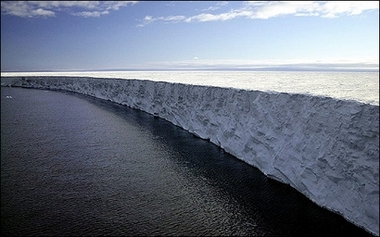
The shear face of the massive B-15A iceberg stretches for 150 kms across McMurdo Sound after it broke off the Ross Ice Shelf in Antartica in 2001. Greenland and Antarctica are at opposite ends of the planet but their climate systems appear to be linked by a remarkable ocean current, according to a study appearing.(AFP/NSF-HO/File)
Greenland and Antarctica are at opposite ends of the planet but their climate systems appear to be linked by a remarkable ocean current, according to a study appearing. The paper, coincidentally published as a key UN conference on climate change unfolds in Nairobi, also sheds light on man-made climate change, for it implies that Antarctica's ice could eventually start to melt because of localized warming in the far North Atlantic.
The evidence comes from a 2,500-metre (8,125-feet-) deep ice core, drilled in blood-freezing chill by European scientists at Dronning Maud Land, on the part of Antarctica that faces the South Atlantic.
With its compacted layers of ice and telltale concentrations of methane in trapped air bubbles, the core yields a compelling picture of snowfall and atmospheric temperatures going back 150,000 years.
Even better than that, it can be matched with cores of similar amplitude drilled in the Greenland icesheet.
Put together, the cores provide the first solid evidence to back a theory that millennial scale climate changes that have unfolded in the far north and south of the Atlantic are not isolated, local events, but linked.
 The shear face of the massive B-15A iceberg stretches for 150 kms across McMurdo Sound after it broke off the Ross Ice Shelf in Antartica in 2001. Greenland and Antarctica are at opposite ends of the planet but their climate systems appear to be linked by a remarkable ocean current, according to a study appearing.(AFP/NSF-HO/File)
The shear face of the massive B-15A iceberg stretches for 150 kms across McMurdo Sound after it broke off the Ross Ice Shelf in Antartica in 2001. Greenland and Antarctica are at opposite ends of the planet but their climate systems appear to be linked by a remarkable ocean current, according to a study appearing.(AFP/NSF-HO/File)
0 Comments:
Post a Comment
<< Home